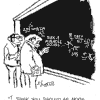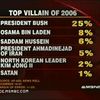15.4.2008 | 15:14
Reuters: Bear-market rally not fooling anyone
Swift, sudden and destined to fizzle out, stock market bear rallies can offer investors a glimmer of optimism when the trend appears to be a one-way street south.
Most major stock indexes have rallied fairly sharply in the past couple of weeks. In Europe, the DJ Stoxx 600 index of leading European shares has risen by nearly 8 per cent since hitting a 2¼ year low in late March.
Multi-billion dollar injections of cash into money markets by some of the top central banks, coupled with investment banks doing their best to scrub their books clean of assets tainted by the US subprime lending crisis, have helped prop up markets.
The question is whether this rally is sustainable. Technical analysts say that, at best, equity markets are in a holding pattern as they attempt to stabilise after months of decline and, at worst, this is the calm before an inevitable storm.
"We're in a bear market whether we like it or not," said Tom Hougaard, chief market strategist at City Index.
"I can easily see that we could be somewhat lulled into a false sense of security, that the market will bounce from here, but we're consolidating in a downtrend, not an uptrend."
The European market is 276 days into the downward trend and has fallen 21 per cent from last July's 6½ year high.
At the same point in the 2000 bear market, the Stoxx 600 had fallen by 8.8 per cent but was only a quarter of the way through a 157-week bear cycle that stripped 60 per cent off the index from its record high on March 7, 2000.
LONG GRIND LOWER
And analysts believe the journey to the bottom of this bear market could be a long slog.
Nicole Elliott, a technical analyst with Mizuho Securities, said a lot of the uncertainty was tied to interbank markets, where rates have remained stubbornly high as banks are wary of lending to each other, despite cash injections by central banks.
"(The recent bounce) has done nothing to change my long-term outlook, which is bearish, and nothing to improve the current conditions, which have essentially been brought about by the credit crunch," Elliott said.
A bear market is commonly defined as at least a 20-per cent fall from a cycle peak. There is no single instrument to differentiate a bear-market rally from the start of a bull run. But a good way to start is by using Fibonnaci retracement ratios -- created by a trendline between two points on a chart.
A bear-market rally is a rise in a falling market that does not breach the 61.8 per cent retracement level -- no European market has come close to that point.
For the DJ Stoxx 600, that level is around 359.50, about 16 per cent above its standing. For Britain's FTSE 100, the level is around 6,211.1, or 5 per cent above its current value.
BLOT ON THE LANDSCAPE
Since the Federal Reserve's emergency 75-basis point cut to US rates in late January, European shares have made several attempts to rally and, typically for a bear market, each attempt has resulted in successively lower peaks and lower troughs.
Another major blot on the European technical picture is the contraction in the spread, or difference, between values on the FTSE 100 and Germany's blue-chip DAX.
Despite some of the FTSE's biggest members being so-called cyclicals, such as banks, oil and mining stocks, the index often acts as a defensive port of call for investors in a downturn.
The DAX, meanwhile, is made up of only 30 stocks, the bulk of which are banks, automobiles and macroeconomically sensitive transport and logistics shares.
At the height of the 2003-2007 bull run, the gap between the two indexes was 1,590 points. This has more than halved to about 690 as the more-volatile DAX has underperformed most western European peers.
"A really reliable indicator is when the DAX is much weaker than the FTSE ... there is no one indicator that will be the be-all and end-all but this one is about as good as it gets," said City Index's Hougaard.
"We are at a crossroads and ... if we go much lower, even by another 10 per cent, I really do think we'll not just be heading into a normal bear market but a fully-fledged recession."
Not everyone is so pessimistic. Gerry Celaya, a technical analyst at Redtower Research, believes current consolidation in the European equity market is likely to form a stable base from which it can rally at some point this year, but he does not rule out another downward move.
"I can see why everyone is looking at this as some sort of bear-market rally, which should peter out or which has petered out, and then see a resumption lower," Celaya said. "The problem we see with that is where does that resumption lower go?
"The most likely scenario is we'll see stock markets tread water from now to the summer, which is really frustrating but is more or less the scenario that unfolds."
Reuters | Tuesday, 15 April 2008
http://www.stuff.co.nz/stuff/dominionpost/4481316a26497.html
Um bloggiš
Baldur Fjölnisson
Nżjustu fęrslur
- Torfi Stefįns bannašur ęvilangt
- OL ķ skįk. Landinn malaši Kenķu ķ 9. umferš
- OL ķ skįk: Landinn ķ 88. sęti eftir 8 umferšir
- Mešaljónar ķ skįkinni
- Baggalśtur - Sagan af Jesśsi
- Eitraš fyrir lżšnum?
- Óvenjulega döpur taflmennska innfęddra einkennir Reyjavķkursk...
- U.S. Rushes Coolant to Japanese Nuke Plant After Earthquake
Heimsóknir
Flettingar
- Ķ dag (11.9.): 0
- Sl. sólarhring:
- Sl. viku: 5
- Frį upphafi: 0
Annaš
- Innlit ķ dag: 0
- Innlit sl. viku: 4
- Gestir ķ dag: 0
- IP-tölur ķ dag: 0
Uppfęrt į 3 mķn. fresti.
Skżringar
Bloggvinir
-
 Agný
Agný
-
 Alfreð Símonarson
Alfreð Símonarson
-
 Andrea J. Ólafsdóttir
Andrea J. Ólafsdóttir
-
 Bjarni Harðarson
Bjarni Harðarson
-
 Bjarni Kjartansson
Bjarni Kjartansson
-
 Björgvin Gunnarsson
Björgvin Gunnarsson
-
 Brynjar Jóhannsson
Brynjar Jóhannsson
-
 FLÓTTAMAÐURINN
FLÓTTAMAÐURINN
-
 Eygló Þóra Harðardóttir
Eygló Þóra Harðardóttir
-
 FreedomFries
FreedomFries
-
 Fríða Eyland
Fríða Eyland
-
 Félag um stafrænt frelsi á Íslandi
Félag um stafrænt frelsi á Íslandi
-
 Georg P Sveinbjörnsson
Georg P Sveinbjörnsson
-
 Gestur Guðjónsson
Gestur Guðjónsson
-
 Gils N. Eggerz
Gils N. Eggerz
-
 Gullvagninn
Gullvagninn
-
 Gunnar Skúli Ármannsson
Gunnar Skúli Ármannsson
-
 Guðrún María Óskarsdóttir.
Guðrún María Óskarsdóttir.
-
 Gísli Hjálmar
Gísli Hjálmar
-
 Hagbarður
Hagbarður
-
 Halla Rut
Halla Rut
-
 Haraldur Haraldsson
Haraldur Haraldsson
-
 Hilmar Kári Hallbjörnsson
Hilmar Kári Hallbjörnsson
-
 Hlekkur
Hlekkur
-
 Ingibjörg Álfrós Björnsdóttir
Ingibjörg Álfrós Björnsdóttir
-
 Jens Guð
Jens Guð
-
 Jóhannes Ragnarsson
Jóhannes Ragnarsson
-
 Jón Aðalsteinn Jónsson
Jón Aðalsteinn Jónsson
-
 Jón Ragnarsson
Jón Ragnarsson
-
 Jón Steinar Ragnarsson
Jón Steinar Ragnarsson
-
 Jónína Benediktsdóttir
Jónína Benediktsdóttir
-
 Karl Tómasson
Karl Tómasson
-
 Kári Magnússon
Kári Magnússon
-
 Loopman
Loopman
-
 Magnús Þór Hafsteinsson
Magnús Þór Hafsteinsson
-
 Promotor Fidei
Promotor Fidei
-
 Rúnar Sveinbjörnsson
Rúnar Sveinbjörnsson
-
 Salvör Kristjana Gissurardóttir
Salvör Kristjana Gissurardóttir
-
 Sandra María Sigurðardóttir
Sandra María Sigurðardóttir
-
 SeeingRed
SeeingRed
-
 Sigurbjörn Friðriksson
Sigurbjörn Friðriksson
-
 Sigurjón Þórðarson
Sigurjón Þórðarson
-
 Sigurður Þórðarson
Sigurður Þórðarson
-
 Snorri Hrafn Guðmundsson
Snorri Hrafn Guðmundsson
-
 el-Toro
el-Toro
-
 Sveinn Ingi Lýðsson
Sveinn Ingi Lýðsson
-
 Tryggvi Hjaltason
Tryggvi Hjaltason
-
 TómasHa
TómasHa
-
 Túrilla
Túrilla
-
 Upprétti Apinn
Upprétti Apinn
-
 gudni.is
gudni.is
-
 haraldurhar
haraldurhar
-
 proletariat
proletariat
-
 Ívar Pálsson
Ívar Pálsson
-
 Ómar Ragnarsson
Ómar Ragnarsson
-
 Ónefnd
Ónefnd
-
 Óskar
Óskar
-
 Óskar Helgi Helgason
Óskar Helgi Helgason
-
 Óskar Þ. G. Eiríksson
Óskar Þ. G. Eiríksson
-
 Þórir Kjartansson
Þórir Kjartansson
-
 Arnar Guðmundsson
Arnar Guðmundsson
-
 Bara Steini
Bara Steini
-
 Birgir R.
Birgir R.
-
 Birgir Rúnar Sæmundsson
Birgir Rúnar Sæmundsson
-
 brahim
brahim
-
 Brosveitan - Pétur Reynisson
Brosveitan - Pétur Reynisson
-
 Bwahahaha...
Bwahahaha...
-
 Dingli
Dingli
-
 eysi
eysi
-
 Gestur Kristmundsson
Gestur Kristmundsson
-
 Guðbjörg Elín Heiðarsdóttir
Guðbjörg Elín Heiðarsdóttir
-
 Gunnar Helgi Eysteinsson
Gunnar Helgi Eysteinsson
-
 Gunnar Rögnvaldsson
Gunnar Rögnvaldsson
-
 Helgi Jóhann Hauksson
Helgi Jóhann Hauksson
-
 Hlini Melsteð Jóngeirsson
Hlini Melsteð Jóngeirsson
-
 Jakobína Ingunn Ólafsdóttir
Jakobína Ingunn Ólafsdóttir
-
 Katrín Snæhólm Baldursdóttir
Katrín Snæhólm Baldursdóttir
-
 kreppukallinn
kreppukallinn
-
 Kristín Magdalena Ágústsdóttir
Kristín Magdalena Ágústsdóttir
-
 Máni Ragnar Svansson
Máni Ragnar Svansson
-
 Morgunblaðið
Morgunblaðið
-
 Neo
Neo
-
 Orgar
Orgar
-
 Ragnar L Benediktsson
Ragnar L Benediktsson
-
 Rauði Oktober
Rauði Oktober
-
 Skákfélagið Goðinn
Skákfélagið Goðinn
-
 Sveinn Þór Hrafnsson
Sveinn Þór Hrafnsson
-
 Vilhjálmur Árnason
Vilhjálmur Árnason
-
 Þór Ludwig Stiefel TORA
Þór Ludwig Stiefel TORA




Bęta viš athugasemd [Innskrįning]
Ekki er lengur hęgt aš skrifa athugasemdir viš fęrsluna, žar sem tķmamörk į athugasemdir eru lišin.